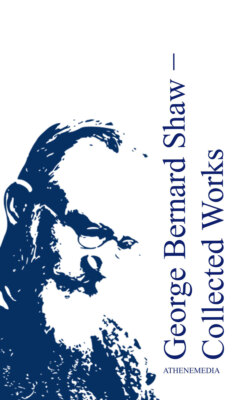Читать книгу Collected Works - George Bernard Shaw, Bernard Shaw - Страница 89
На сайте Литреса книга снята с продажи.
A TOUCHSTONE FOR DOGMA
ОглавлениеThe test of a dogma is its universality. As long as the Church of England preaches a single doctrine that the Brahman, the Buddhist, the Mussulman, the Parsee, and all the other sectarians who are British subjects cannot accept, it has no legitimate place in the counsels of the British Commonwealth, and will remain what it is at present, a corrupter of youth, a danger to the State, and an obstruction to the Fellowship of the Holy Ghost. This has never been more strongly felt than at present, after a war in which the Church failed grossly in the courage of its profession, and sold its lilies for the laurels of the soldiers of the Victoria Cross. All the cocks in Christendom have been crowing shame on it ever since; and it will not be spared for the sake of the two or three faithful who were found even among the bishops. Let the Church take it on authority, even my authority (as a professional legend maker) if it cannot see the truth by its own light: no dogma can be a legend. A legend can pass an ethnical frontier as a legend, but not as a truth; whilst the only frontier to the currency of a sound dogma as such is the frontier of capacity for understanding it.
This does not mean that we should throw away legend and parable and drama: they are the natural vehicles of dogma; but woe to the Churches and rulers who substitute the legend for the dogma, the parable for the history, the drama for the religion! Better by far declare the throne of God empty than set a liar and a fool on it. What are called wars of religion are always wars to destroy religion by affirming the historical truth or material substantiality of some legend, and killing those who refuse to accept it as historical or substantial. But who has ever refused to accept a good legend with delight as a legend? The legends, the parables, the dramas, are among the choicest treasures of mankind. No one is ever tired of stories of miracles. In vain did Mahomet repudiate the miracles ascribed to him: in vain did Christ furiously scold those who asked him to give them an exhibition as a conjurer: in vain did the saints declare that God chose them not for their powers but for their weaknesses; that the humble might be exalted, and the proud rebuked. People will have their miracles, their stories, their heroes and heroines and saints and martyrs and divinities to exercise their gifts of affection, admiration, wonder, and worship, and their Judases and devils to enable them to be angry and yet feel that they do well to be angry. Every one of these legends is the common heritage of the human race; and there is only one inexorable condition attached to their healthy enjoyment, which is that no one shall believe them literally. The reading of stories and delighting in them made Don Quixote a gentleman: the believing them literally made him a madman who slew lambs instead of feeding them. In England today good books of Eastern religious legends are read eagerly; and Protestants and Atheists read Roman Catholic legends of the Saints with pleasure. But such fare is shirked by Indians and Roman Catholics. Freethinkers read the Bible: indeed they seem to be its only readers now except the reluctant parsons at the church lecterns, who communicate their discomfort to the congregation by gargling the words in their throats in an unnatural manner that is as repulsive as it is unintelligible. And this is because the imposition of the legends as literal truths at once changes them from parables into falsehoods. The feeling against the Bible has become so strong at last that educated people not only refuse to outrage their intellectual consciences by reading the legend of Noah's Ark, with its funny beginning about the animals and its exquisite end about the birds: they will not read even the chronicles of King David, which may very well be true, and are certainly more candid than the official biographies of our contemporary monarchs.
